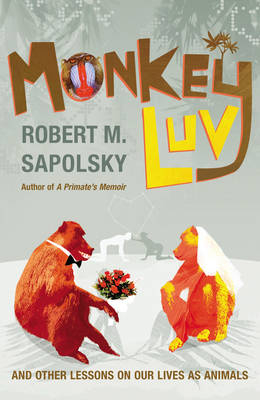
Monkeyluv And Other Lessons in Our Lives as Animals
Seiten
2005
Jonathan Cape Ltd (Verlag)
978-0-224-07365-3 (ISBN)
Jonathan Cape Ltd (Verlag)
978-0-224-07365-3 (ISBN)
- Titel ist leider vergriffen;
keine Neuauflage - Artikel merken
Contains a collection of essays aiming to expose us as the animals that we are while explaining behaviours that are deeply and recognisably human. This book has been divided into three sections: 'Our Genes and Who We Are', 'Our Bodies and Who We Are', and 'Society and Who We Are'.
This fascinating collection of essays exposes us as the animals that we are while explaining behaviours that are deeply and recognisably human. The first section, 'Our Genes and Who We Are', focuses on our genetic endowment and the forces it creates in our lives, such as our need to seek out beauty. Another essay explains the invisible genetic warfare that takes place between men and women as they conceive a baby, which continues as the foetus develops. The second part of the book, 'Our Bodies and Who We Are', ponders such diverse topics as why dreams are in fact dream-like; why we are sexually attracted to one another; why Alzheimer's disease tends to be a post-menopausal phenomenon; and why grandmothers buying groceries for their grandchildren are part of nature's Darwinian logic. In the third section, 'Society and Who We Are', Sapolsky takes his interdisciplinary curiosity out into the wilds of civilization and poses such interesting questions as when and why our preferences in food become fixed.
Or, why do desert cultures tend to be monotheistic and sexually repressed whereas rainforest dwellers tend towards sexually-relaxed polytheistic cultures, and why do people from the lower economic classes have more health problems? In each of these investigations, we see Sapolsky's brilliant mind synthesising a wealth of research in a thoughtful, engaging way that satisfyingly reveals the enormous complexity of simply being a human animal.
This fascinating collection of essays exposes us as the animals that we are while explaining behaviours that are deeply and recognisably human. The first section, 'Our Genes and Who We Are', focuses on our genetic endowment and the forces it creates in our lives, such as our need to seek out beauty. Another essay explains the invisible genetic warfare that takes place between men and women as they conceive a baby, which continues as the foetus develops. The second part of the book, 'Our Bodies and Who We Are', ponders such diverse topics as why dreams are in fact dream-like; why we are sexually attracted to one another; why Alzheimer's disease tends to be a post-menopausal phenomenon; and why grandmothers buying groceries for their grandchildren are part of nature's Darwinian logic. In the third section, 'Society and Who We Are', Sapolsky takes his interdisciplinary curiosity out into the wilds of civilization and poses such interesting questions as when and why our preferences in food become fixed.
Or, why do desert cultures tend to be monotheistic and sexually repressed whereas rainforest dwellers tend towards sexually-relaxed polytheistic cultures, and why do people from the lower economic classes have more health problems? In each of these investigations, we see Sapolsky's brilliant mind synthesising a wealth of research in a thoughtful, engaging way that satisfyingly reveals the enormous complexity of simply being a human animal.
Robert M. Sapolsky holds degrees from Harvard and Rockefeller Universities and is currently a Professor of Biology and Neurology at Stanford University and a Research Associate with the Institute of Primate Research, National Museums of Kenya. He is the author of The Trouble with Testosterone, Why Zebras Don't Get Ulcers (both finalists for the LA Times Book Award), and A Primate's Memoir (also published by Cape). A regular contributor to Natural History, Discover, Men's Health, and Scientific American, and a recipient of a MacArthur Foundation genius grant, Sapolsky lives in San Francisco.
| Erscheint lt. Verlag | 6.10.2005 |
|---|---|
| Verlagsort | London |
| Sprache | englisch |
| Maße | 154 x 241 mm |
| Gewicht | 440 g |
| Themenwelt | Sachbuch/Ratgeber ► Natur / Technik |
| Studium ► 2. Studienabschnitt (Klinik) ► Humangenetik | |
| Naturwissenschaften ► Biologie ► Genetik / Molekularbiologie | |
| Naturwissenschaften ► Biologie ► Humanbiologie | |
| ISBN-10 | 0-224-07365-6 / 0224073656 |
| ISBN-13 | 978-0-224-07365-3 / 9780224073653 |
| Zustand | Neuware |
| Haben Sie eine Frage zum Produkt? |
Mehr entdecken
aus dem Bereich
aus dem Bereich
Eine sehr persönliche Geschichte | Der New York Times-Bestseller
Buch | Softcover (2023)
Ullstein Taschenbuch Verlag
21,99 €
Die revolutionäre Medizin von morgen (Lifespan)
Buch | Softcover (2020)
DuMont Buchverlag
16,00 €


